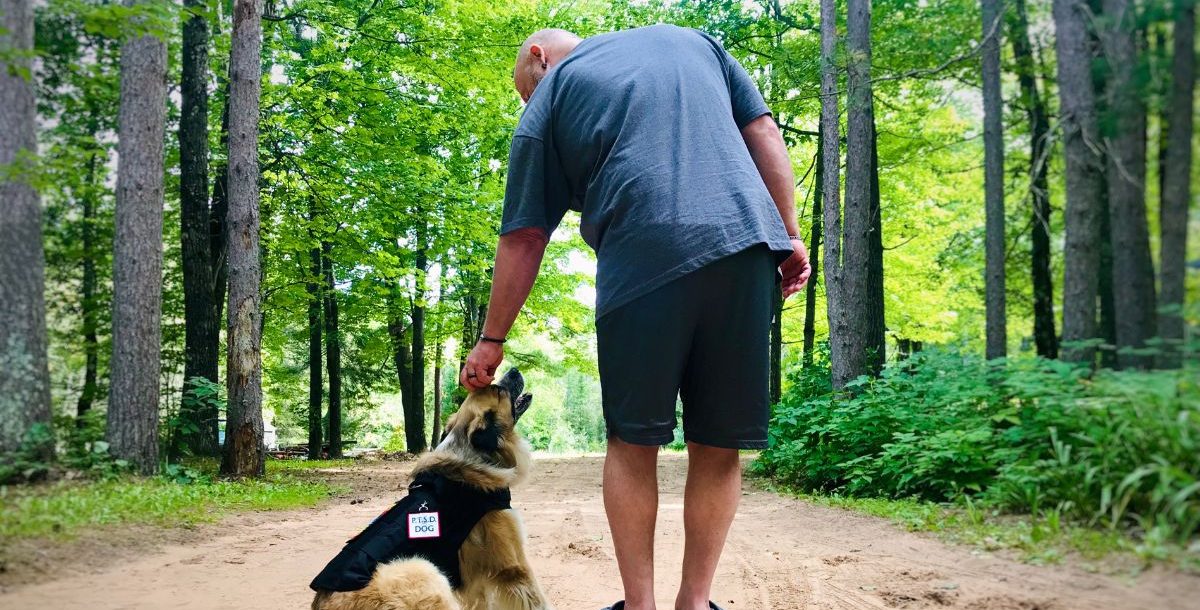Mental health service dogs aren’t just pets – they’re life-changing companions, trained to help people manage their mental health conditions. These incredible animals go beyond offering comfort; they’re skilled in providing real support, stepping in when their handlers need them most.
Whether it’s calming someone during a panic attack, reminding them to take their medication or guiding them to a safe space, these dogs are there at every step.
Mental health service dogs are invaluable allies to people living with post-traumatic stress disorder (PTSD), schizophrenia, depression, anxiety or bipolar disorder. They provide companionship and actively help their handlers navigate daily life by performing tasks designed to ease symptoms and provide stability.
If you have a condition that may be improved with a mental health service dog, make an appointment with your mental health provider to learn more.
What are mental health service dogs?
Mental health service dogs are service animals trained to assist people with mental health conditions. They play a crucial role in helping people manage their day-to-day lives and improve their mental health and overall well-being.
While emotional support animals provide comfort simply through their presence, service dogs are trained to perform tasks that help their handlers function daily.
Specialized training for mental health service dogs
Mental health service dogs undergo extensive training to learn specific tasks that directly assist their handlers. These tasks are tailored to address the symptoms of their handler’s mental illness and can include:
- Tactile stimulation: Providing physical contact, such as deep pressure therapy, to help calm their handler during anxiety attacks or panic attacks.
- Interrupting harmful behaviors: Nudging or pawing their handler to interrupt self-harm behaviors or compulsive actions linked to anxiety disorders or bipolar disorder.
- Medication reminders: Alerting their handler when it’s time to take medication, ensuring consistency in treatment.
- Guiding to a safe place: Leading their handler to a designated safe location during episodes of disorientation, anxiety or distress.
- Nightmare interruption: Waking their handler from nightmares, which is a critical task for people suffering from PTSD.
- Alerting to emotional escalation: Recognizing early signs of emotional distress and providing intervention before a panic attack or manic episode occurs.
Types of service dogs
There are various types of service dogs trained to assist people with different disabilities. Among them, psychiatric service dogs (PSD) specifically support people with mental illnesses. Other types include guide dogs for the visually impaired, mobility assistance dogs and seizure alert dogs.
Psychiatric service dogs play an essential role in assisting people with conditions like schizophrenia, PTSD and severe anxiety disorders. Unlike emotional support animals, PSDs are not just present to provide comfort. They are trained to assist in ways that actively mitigate the symptoms of their handler’s mental illness.
Benefits of mental health service dogs
Mental health service dogs offer a wide range of benefits to their handlers, significantly improving their quality of life. Some of the key benefits include:
- Reducing anxiety and stress: A service dog’s calming presence can help lower anxiety levels, offering a sense of security and stability.
- Enhancing independence: Service dogs assist with daily tasks, helping people maintain routines and complete essential activities.
- Providing emotional support: Although their primary function is task-oriented, service dogs naturally offer companionship, which can alleviate loneliness and depression.
- Encouraging social interactions: A service dog’s presence can help reduce feelings of isolation and make social interactions more manageable.
- Promoting physical activity: Handlers often become more active through routine dog care, leading to improved physical and mental health.
Conditions mental health service dogs help with
Mental health service dogs can provide life-changing support for people with a variety of mental illnesses, including:
- Anxiety disorders: These dogs can detect early signs of anxiety and help soothe their handler through tactile stimulation.
- Depression: The companionship of a service dog can provide motivation and emotional support, reducing symptoms of severe depression.
- Bipolar disorder: The support these dogs provide can help people manage mood fluctuations by recognizing early warning signs of manic or depressive episodes.
- Schizophrenia: These dogs provide reality orientation and grounding techniques that assist people experiencing hallucinations or paranoia.
- PTSD: Service dogs play a crucial role in helping people manage PTSD symptoms. They can guide them away from triggering environments, providing a sense of safety and interrupting flashbacks.
Do mental health service dogs have legal protections?
The Americans with Disabilities Act (ADA) provides clear legal protections for service animals, including psychiatric service dogs. According to the ADA:
- Public areas must allow service dogs, even if pets are generally prohibited.
- Businesses and organizations cannot deny access to a service dog, even if they have a “no pets” policy.
- Handlers aren’t required to carry certification or documentation for their service dog. However, having registration on hand can help prevent issues in public spaces.
- Establishments, such as hotels or rental properties, can’t charge people with service animals additional fees for bringing their dog inside.
Understanding these legal rights ensures that handlers and their service dogs can navigate public spaces without unnecessary barriers.
How we can help
Mental health service dogs can have a profound impact on people’s lives. Whether you are looking to learn more about mental health service dogs, find a reputable service dog training program or seek assistance in obtaining a service dog, talk to your mental health professional. They can guide you on whether a service dog may help you and get you started on the process.
Learn about the behavioral and mental health services we offer at Mercy Health.






